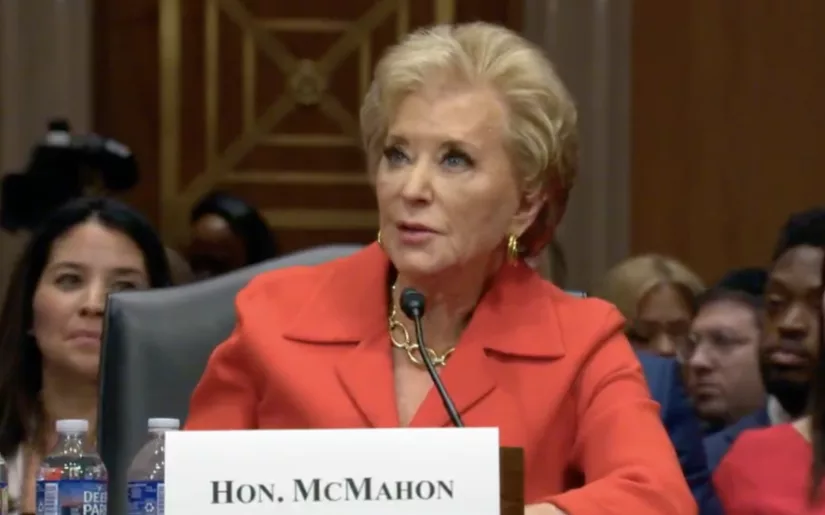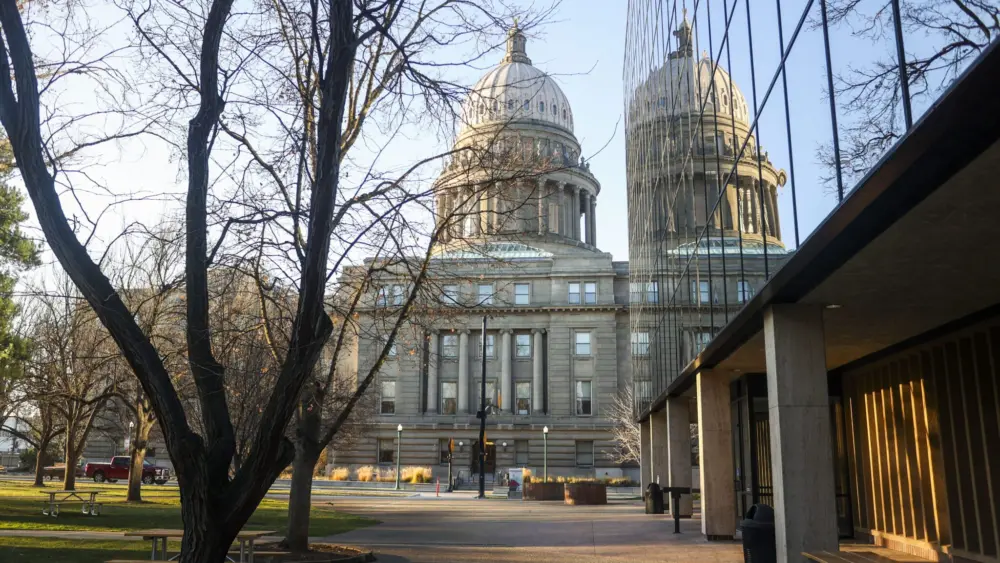In a departure from previous cases, the Department of Education publicly announced investigations against Washington and Maine for presumed violations.
OLYMPIA, WA – When the Trump Administration announced its Title IX investigation into Washington’s Office of the Superintendent of Public Instruction on April 30, it made immediate headlines.
That’s not how most Title IX investigations play out. The Department of Education, which launched the investigation alongside the Department of Justice, argued that “Multiple Washington State school districts have reported that OSPI is requiring school boards to adopt policies that allow males to participate in female sports and occupy female-only intimate facilities, thereby raising substantial Title IX concerns,” according to a department press release.
Washington’s OSPI first caught the federal government’s attention thanks to the release of findings from a yearslong investigation into a discrimination complaint against La Center School District in Clark County. The state office’s decision, released in February, concluded that the district’s policies not allowing teachers to ask about students’ pronouns violate the state’s Revised Code of Washington – specifically guidelines from 2020 intended to eliminate discrimination in public schools on the basis of gender and gender identity. The state guidelines require that teachers ask for students’ pronouns proactively and not automatically share information about a student’s gender identity with their parents without consent. La Center appealed the decision, which would have required it to come up with new guidelines within 45 days.
When the investigation into OSPI began the following month, officials cited both Washington’s law allowing transgender students to participate in school sports according to their gender identity, and the La Center case specifically.
Education Secretary Linda McMahon said in the announcement of the federal investigation that the administration was strongly presuming a violation of Title IX, as well as the Family Educational Rights and Privacy Act and the Protection of Pupil Rights Amendment. “Washington State appears to use its position of authority to coerce its districts into hiding ‘gender identity’ information from students’ parents and to adopt policies to covertly smuggle gender ideology into the classroom, confusing students and letting boys into girls’ sports, bathrooms, and locker rooms,” she said. “If true, these are clear violations of parental rights and female equality in athletics, which are protected by federal laws that will be enforced by the Trump Administration.”
This presumptive language is a departure from how Title IX investigations are typically handled, if they are announced at all, said Amy Klosterman, a private attorney and Title IX investigator who previously worked with the Department of Education’s Office for Civil Rights.
“In the past, [the Office for Civil Rights] did not make these proclamations that appear to already presume that there’s a violation,” said Klosterman. In fact, she noted, many were not publicly announced until the investigation was completed – a process that can take years.
Title IX, the education amendment passed in 1972, dictates that all schools receiving federal funding must not discriminate “on the basis of sex.” Funding can be withheld if an institution is found to be in noncompliance with the policy. But in the law’s 50-year-plus history, no institution has ever actually had their funding revoked — because the parties always agreed to work toward addressing the inequity.
A Title IX investigation is usually a lengthy and thorough affair, sparked either by a complaint to the Office for Civil Rights (which can be brought by anyone) about a perceived inequity – such as a girls’ soccer team not receiving the same amount of funding or field time as the boys’ team at the same school – or a directed investigation into an institution with higher-than-average rates of reported sexual assault on campus. Investigating an entire state’s educational system based on the idea that the state’s equity laws are in violation of a single presidential executive order is “a new tactic for the federal government to use in Title IX enforcement,” said Klosterman.
After the investigation was announced, State Superintendent Chris Reykdal told KUOW that “My office will enforce our current laws as we are required to do until Congress changes the law and/or federal courts invalidate Washington state’s laws. Unless, and until that happens, we will be following Washington state’s laws, not a president’s political leanings expressed through unlawful orders.”
That’s because executive orders do not supersede state law, said Reykdal. And in Washington, nondiscrimination on the basis of gender identity has been the law since 2006. State law has also allowed transgender students to participate on sports teams matching their gender identity since 2007. “Washington public schools have a responsibility to provide a safe and nondiscriminatory environment for all students, including transgender and gender-expansive students, so that all students can thrive,” Katie Hannig, a spokesperson for OSPI, said in an email.
Learning from Maine
But that doesn’t mean these policies won’t be tested in court, as a similar case unfolding in Maine demonstrates. In February, Maine Governor Janet Mills made headlines at a meeting of governors at the White House. “We’ll see you in court,” she said to President Donald Trump, who claimed that he would pull federal dollars from states allowing transgender athletes to play on sports teams consistent with their gender identity. A Title IX investigation followed, unprecedented in its speed.
After the state was found by the Department of Education’s Office for Civil Rights to be in violation of the law according to the Trump administration, officials in Maine refused to sign a resolution agreement to change their state law regarding inclusion of transgender student athletes. Maine has faced a multipronged pressure campaign from the federal government ever since, including threats to end a program that automatically enrolls infants born in Maine with Social Security numbers and freezing various U.S. Department of Agriculture funds for the state, including for nutrition programs.
In April, a federal judge in Maine ordered the USDA to immediately unfreeze the funding because, he said, the agency did not comply with procedure. On May 2, Maine announced it had reached a settlement with the USDA and would be dropping the lawsuit.
But that doesn’t mean the legal battle is over. The DOJ has since sued the state for refusing to sign the resolution agreement from the department that would, according to the federal government, bring the state into Title IX compliance. Maine Attorney General Aaron Frey is countering the claim, arguing that Trump’s executive order “mischaracterize[s] the meaning of ‘sex’ as described in Title IX” and is unconstitutional.
The case is expected to go to trial in December.
Uncertain path forward
Given what happened in Maine, Northwest education policy experts are unsure what might play out locally. “Unfortunately, it feels like anything is possible,” said David Knight, an associate professor of education policy and finance at the University of Washington.
That uncertainty may already be having an impact on school funding. Knight studies budget uncertainties in schools as well as short-term budget cuts, “and one of the key takeaways from all of that research is that schools benefit from stability.”
Since a district can’t run on a deficit, school officials will often cut their workforce until they know what the next year brings, which creates turmoil. Budget uncertainties at higher levels of government, such as losing Department of Education funding, can put additional stress on teachers and administrators. “Even just the threat of potential cuts can put teachers on edge and make it more difficult for them to do their jobs and put school leaders on edge, and do damage to hardworking educators who are just trying to do their jobs,” he said.
Ironically, many of the districts at the greatest risk if funding is pulled are located in the areas that supported Trump’s candidacy. “Federal funding is just so incredibly critical, and particularly in Washington, those benefiting most from federal funds tend to be lower-income, higher-poverty areas, and in Washington, they tend to be more conservative-leaning,” said Knight.
For instance, the Kennewick school district in Eastern Washington, which filed an official complaint with the U.S. Department of Education in March over the state’s transgender athlete policy, receives 8.9% of funding from the federal government, above the state’s average of 6.95%, according to data from the state. In Benton County, where Kennewick is located, nearly 60% of voters in the 2024 general election supported Donald Trump.
Visit cascadepbs.org/donate to support nonprofit, freely distributed, local journalism.





